大学英语三(综合教程)第三单元
《全新版大学进阶英语综合教程3》Unit3教案(20200701094738)
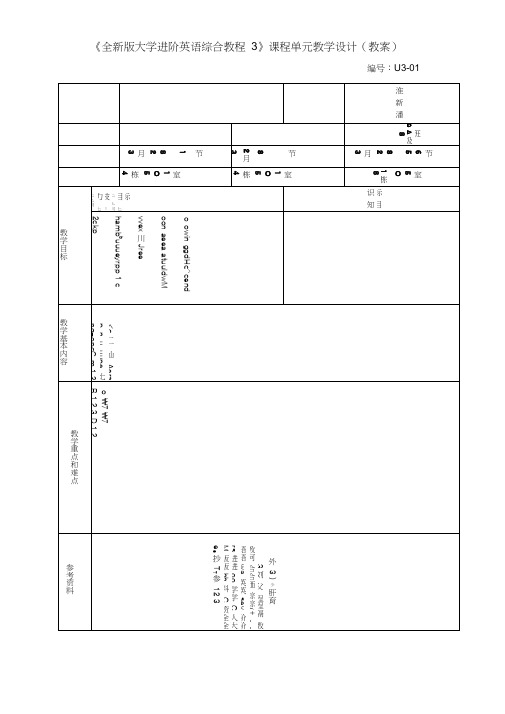
《全新版大学进阶英语综合教程3》课程单元教学设计(教案)编号:U3-01Opener:Pair work: The pictures below compare Westerners (marked in blue) and Chinese (marked in pink) in their way of looking at children and the family, travelling, and the role of the boss in an organization. Look at the pictures an work with your part ner to an swer the questio ns that follow.Helpful Expressi ons接送孩子 drop off and pick up the child 风土人情 local customs and culture 至吐匕一游 been here, done that 高高在上 superiority 有权有势 powerfulQuestio ns:1 In what way does the role of grandparents in Chinese families differ from that in Western families?2 In what way do Western tourists and Chin ese tourists behave differe ntly?3 In what way do Western and Chinese employees differ in the way they look upon their boss?Tips in this part:1. In troduce the topic to the class by ask ing if they can give any example of how Chinese and non-Chinese behave or think differently in life.2. Explai n the pictures in Opener that illustrate the differe nces betwee n the Westerners and Chin ese in their perspective on differe nt issues.3. Ask Ss to look at the pictures and discuss the differences in pairs with the aid of the questi ons that follow.4. To sum up, have differe nt pairs report to the class their discussi on on the pictures, one pair for one picture.Video watchi ng:After watch ing a video clip about an in terview with three foreig n wome n marrying Chinese husbands, discuss the following questions with yourSteps(步骤)教学组织1.whe n what is the differe nee Trave^llfiMg■SiStep One(步骤一)Step Two(步骤二)part ner.《全新版大学进阶英语综合教程3》课程单元教学设计(教案)编号:Comprehe nsion check1. Text Orga ni zati onPair work: This text is organized around the cultural shock the authorexperieneed after the birth of her daughter and her mother-in-law ' fulltime presenee in her family. It can roughly be divided into six parts. Now complete the follow ing table by writ ing dow n the main idea of each part. The first one has been done for you. When you finish, compare notes with your partner.Steps(步骤)教学组织Step One (步骤一)2 Comprehe nsion Check Pair work: With the teacher as guide, you and your partner work on the follow ing comprehe nsion check exercises. 2.1 Diggi ng into detailAn swer the follow ing questi ons to better un dersta nd the text. You may wantto write dow n some key words in the space provided before you do so. (Para. 6) 1 What made the author so mad about her husba nd that they bega n to fight over childcare duties?The fact that he wasn ' t tak ing on half of the childcare duties, and he thought it was more important to spend time on his work than on his daughter, and his expectation that his mother would do all the housework he was supposed to do.(Para. 8) 2 How did her mother-i n-law explai n her role in the family?Her mother-in-law explained that her role in the family was to lighten the burde n of her son, allow ing him to keep his former way of life, and to help her daughter- in-law out with pare nti ng and household man ageme nt.(Para. 9) 3 What did the author think of her mother-in-aw ' s explanation?She thought it was absolutely un acceptable, because, in her view, her husband is one of two parents, and therefore their daughter should be half his responsibility; and she married her husband, not her mother-in-law.(Para. 13) 4 How come her husband, unlike the author, failed to adopt daily habits around the schedule of their daughter?He obviously believed that mothers are the primary caregiver of childre n and this was the no rmal differe nee betwee n mothers and fathers.(Para. 16) 5 How did the author react whe n she was told that, now that her mother-in-law helped her out by taking care of her daughter, it was her resp on sibility to take care of her mother-i n-law whe n she was old?She totally rejected the idea, because she thought what her mother-in-law did was fulfillingthe parenting responsibility of her husband, therefore it was her husband ' s responsibility to take care of his own mother when she was old. 2.2 Un dersta nding difficult senten cesTips in this part :1. Before moving onto the author ' s explou n ttp Ss the text can rough divided into six parts.2. Guide Ss to explore the text by asking them to work on the table in Orga ni zati on and do the task in Digg ing into detail.3. Ask Ss to sum up the differences of views between the author and her mother- in-law on matters described in the text.4. Check Ss' understanding by guiding them through the tasks in Un dersta nding difficult senten ces. Text An alysisThe author ' r eflections on childcare are skilfully framed between the con versati ons with other wives that ope n and close the text. The ope ning sets the scene and introduces her husband and herself. Next comes her mother-in-law, whose strong senseof duty is expressed in a shift to short, emphatic senten ces:“ Her role isclear. She has to be here. ”What follows is part factual account, part persuasive argument. The author does not simply give a neutral description of the differences between her husba nd and herself. She clearly wishes to persuade us that she is right and he is wrong. As a con seque nceher writ ing contains much in com mon with other pieces of persuasive writing. There are therhetorical questions : “lam expected …but he is relieved of his fatherly duties …?” “ Why does he getout of the datasks …?T here is the emotive Ianguage. She is "incensed a f what she sees as hisStep Two(步骤二)“ laz in ess ” ; he “ was n' t honouring ” his role as a father.Towards the end she admits that he has made an effort to compromise, though eve n here she is quick to add “ in resp onse to my growli ngwith the impression of an uneasy truce rather than a meeting of minds.Step Three (步骤三)II. Lan guage FocusWords and expressi ons1. negotiation: n.磋商;谈判e.g. The 6-month negotiations between the two countries ended fruitlessly. 两国谈判半年一无所获。
全新版大学英语综合教程3课文翻译
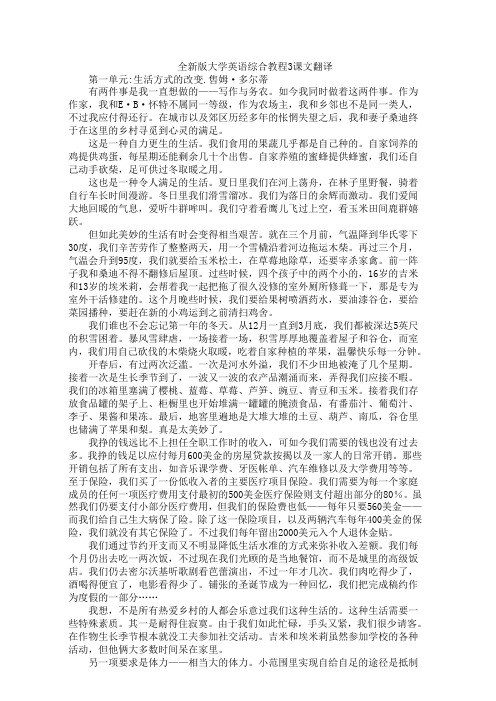
全新版大学英语综合教程3课文翻译第一单元:生活方式的改变.售姆·多尔蒂有两件事是我一直想做的——写作与务农。
如今我同时做着这两件事。
作为作家,我和E·B·怀特不属同一等级,作为农场主,我和乡邻也不是同一类人,不过我应付得还行。
在城市以及郊区历经多年的怅惘失望之后,我和妻子桑迪终于在这里的乡村寻觅到心灵的满足。
这是一种自力更生的生活。
我们食用的果蔬几乎都是自己种的。
自家饲养的鸡提供鸡蛋,每星期还能剩余几十个出售。
自家养殖的蜜蜂提供蜂蜜,我们还自己动手砍柴,足可供过冬取暖之用。
这也是一种令人满足的生活。
夏日里我们在河上荡舟,在林子里野餐,骑着自行车长时间漫游。
冬日里我们滑雪溜冰。
我们为落日的余辉而激动。
我们爱闻大地回暖的气息,爱听牛群哞叫。
我们守着看鹰儿飞过上空,看玉米田间鹿群嬉跃。
但如此美妙的生活有时会变得相当艰苦。
就在三个月前,气温降到华氏零下30度,我们辛苦劳作了整整两天,用一个雪橇沿着河边拖运木柴。
再过三个月,气温会升到95度,我们就要给玉米松土,在草莓地除草,还要宰杀家禽。
前一阵子我和桑迪不得不翻修后屋顶。
过些时候,四个孩子中的两个小的,16岁的吉米和13岁的埃米莉,会帮着我一起把拖了很久没修的室外厕所修葺一下,那是专为室外干活修建的。
这个月晚些时候,我们要给果树喷洒药水,要油漆谷仓,要给菜园播种,要赶在新的小鸡运到之前清扫鸡舍。
我们谁也不会忘记第一年的冬天。
从12月一直到3月底,我们都被深达5英尺的积雪困着。
暴风雪肆虐,一场接着一场,积雪厚厚地覆盖着屋子和谷仓,而室内,我们用自己砍伐的木柴烧火取暖,吃着自家种植的苹果,温馨快乐每一分钟。
开春后,有过两次泛滥。
一次是河水外溢,我们不少田地被淹了几个星期。
接着一次是生长季节到了,一波又一波的农产品潮涌而来,弄得我们应接不暇。
我们的冰箱里塞满了樱桃、蓝莓、草莓、芦笋、豌豆、青豆和玉米。
接着我们存放食品罐的架子上、柜橱里也开始堆满一罐罐的腌渍食品,有番茄汁、葡萄汁、李子、果酱和果冻。
创新大学英语3综合教程(华东师范大学出版社)第三单元单词

adj.
having a great influence or effect深远的,长久的
individually
adv.
separately, not together in a group个别地
Proper Names
Webster's Concise Dictionary
wear off
to decrease, or even disappear, gradually逐渐减少(消失)
evaluate
v.
to judge how good, useful, or successful sth. is评估(价)
phase
n.
one of the stages of a process of development or change阶段,时期
foster
vt.
to help a skill, feeling, idea, etc., develop over a period of time培养(育)
admit
v.
(~ to sth./to doing sth.) to agree, often unwillingly, that sth. is true承(供)认
intellectual
adj.
n.
relating to the ability to understand things and think intelligently智力的
an intelligent, well-educated person知识分子
concise
adj.
short, with no unnecessary words简洁(明)的
新标准大学英语综合教程3:U3_AR1
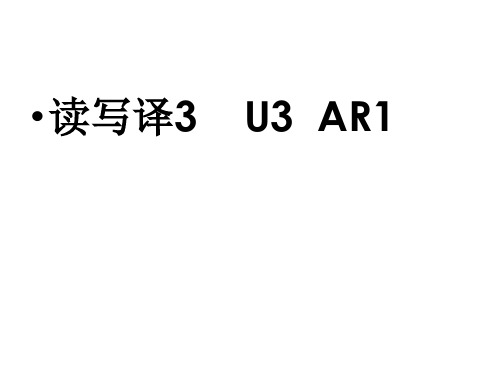
Back
Active reading 1: Resources
Difficult sentences
4. Yes, the sound appeal of music is a potent and primitive force, but you must not allow it to usurp a disproportionate share of your interest... but it does not constitute the whole story. (Para 4)
把听的过程机械地分割为以上三个假想的层次,唯一好处是让我 们更清楚地了解自己是怎样听音乐的。
Back
Active reading 1: Resources
Difficult sentences
3. Music allows them to leave it... dreaming because of and apropos of the music yet never quite listening to it. (Para 3) What does apropos of mean? It means “relating to”; it is used to introduce something else about the subject we are talking about.
What do the musical materials refer to? The musical materials refer to the elements of music. They are melody, rhythm, harmony, tone color, and form. Translate the sentence.
《全新版大学进阶英语综合教程3》Unit 3教案
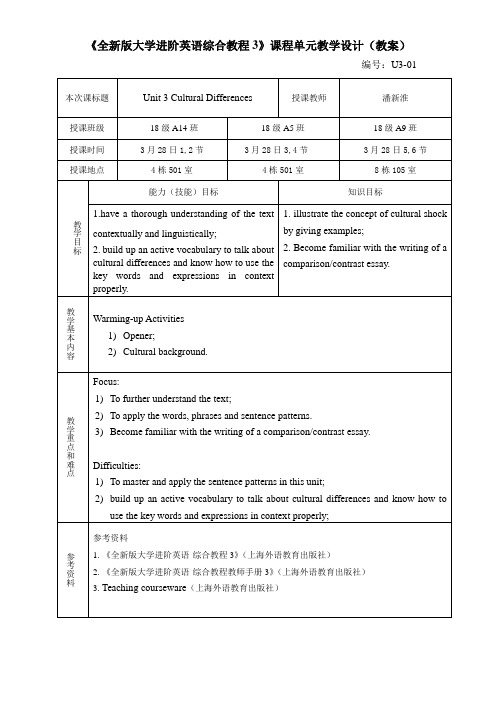
《全新版大学进阶英语综合教程3》课程单元教学设计(教案)编号:U3-01Steps(步骤)教学组织Step One (步骤一)Opener:Pair work: The pictures below compare Westerners (marked in blue) and Chinese (marked in pink) in their way of looking at children and the family, travelling, and the role of the boss in an organization. Look at the pictures and work with your partner to answer the questions that follow.Helpful Expressions接送孩子drop off and pick up the child风土人情local customs and culture到此一游been here, done that高高在上superiority有权有势powerfulQuestions:1 In what way does the role of grandparents in Chinese families differ from that in Western families?2 In what way do Western tourists and Chinese tourists behave differently?3 In what way do Western and Chinese employees differ in the way they look upon their boss?Tips in this part:1. Introduce the topic to the class by asking if they can give any example of how Chinese and non-Chinese behave or think differently in life.2. Explain the pictures in Opener that illustrate the differences between the Westerners and Chinese in their perspective on different issues.3. Ask Ss to look at the pictures and discuss the differences in pairs with the aid of the questions that follow.4. To sum up, have different pairs report to the class their discussion on the pictures, one pair for one picture.Step Two (步骤二)Video watching:After watching a video clip about an interview with three foreign women marrying Chinese husbands, discuss the following questions with your partner.1. According to the video, when raising grandchildren, what is the difference《全新版大学进阶英语综合教程3》课程单元教学设计(教案)编号:U3-02《全新版大学进阶英语综合教程3》课程单元教学设计(教案)编号:U3-03《新视野大学英语(第三版)》Book 3课程单元教学设计(教案)编号:U3-04DiscussionDiscuss what you like / dislike about where you live.things you like:a food market; a bookstore; close to the metro; a good hospital / medical care centerthings that are nice but not essentiala good local supermarket; a sports center;a theater / cinema; a barthings you dislike:lacking of parking space; various types of noise; pollution; high crime rateThink about your neighborhood. What would make it:safer?Lectures should be given to tell people how to prevent fire, theft and other dangers. Besides, the police should make sure the streets are safe –not only from crime but also from traffic accidents.more beautiful?I think we should plant more trees and flowers in the community. In addition, we should discipline our own behavior and should not litter garbage everywhere or draw on the buildings.more interesting?More entertainment activities should be held to draw the interest of people. Meanwhile, don’t forget the children. We should also provide them with facilities to give them fun and joy.better for your health?I think we should build a community gym providing a variety of affordable exercise options. Besides, activities should be conducted to help people quit smoking or excessive drinking.more of a community?I’d really like to see a good shopping mall, where people can meet, get to know each other and entertain themselves.。
全新版大学英语综合教程第三册Unit 3 Text A练习答案和语言点学习
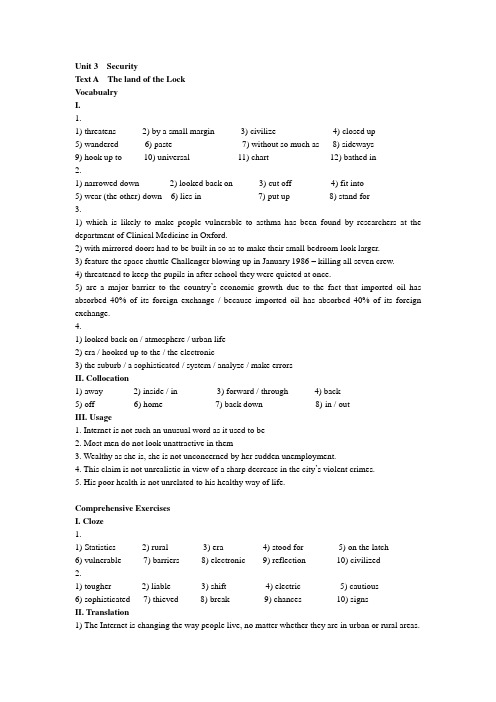
Unit 3 SecurityText A The land of the LockVocabualryI.1.1) threatens 2) by a small margin 3) civilize 4) closed up5) wandered 6) paste 7) without so much as 8) sideways9) hook up to 10) universal 11) chart 12) bathed in2.1) narrowed down 2) looked back on 3) cut off 4) fit into5) wear (the other) down 6) lies in 7) put up 8) stand for3.1) which is likely to make people vulnerable to asthma has been found by researchers at the department of Clinical Medicine in Oxford.2) with mirrored doors had to be built in so as to make their small bedroom look larger.3) feature the space shuttle Challenger blowing up in January 1986 – killing all seven crew.4) threatened to keep the pupils in after school they were quieted at once.5) are a major barrier to the country’s economic growth due to the fact that imported oil has absorbed 40% of its foreign exchange / because imported oil has absorbed 40% of its foreign exchange.4.1) looked back on / atmosphere / urban life2) era / hooked up to the / the electronic3) the suburb / a sophisticated / system / analyze / make errorsII. Collocation1) away 2) inside / in 3) forward / through 4) back5) off 6) home 7) back down 8) in / outIII. Usage1. Internet is not such an unusual word as it used to be2. Most men do not look unattractive in them3. Wealthy as she is, she is not unconcerned by her sudden unemployment.4. This claim is not unrealistic in view of a sharp decrease in the city’s violent crimes.5. His poor health is not unrelated to his healthy way of life.Comprehensive ExercisesI. Cloze1.1) Statistics 2) rural 3) era 4) stood for 5) on the latch6) vulnerable 7) barriers 8) electronic 9) reflection 10) civilized2.1) tougher 2) liable 3) shift 4) electric 5) cautious6) sophisticated 7) thieved 8) break 9) chances 10) signsII. Translation1) The Internet is changing the way people live, no matter whether they are in urban or rural areas.2) Medium-sized and small companies are more vulnerable to the threat of the global economic crisis than large ones.3) With regard to our term papers, the professor asked us to analyze the chart of unemployment first, and then provide critical reflections on the nation’s economic development.4) It never occurred to him that their team would win the basketball match by a large margin.5) Looking back on my twenty year’s teaching in high school, I attributed my success to patience, talent, and the constant pursuit of knowledge.2.It is almost impossible to keep a determined burglar out. All you can is discourage him for a few minutes, thus exposing him to police patrols. Common sense tells us that lighting is a barrier to criminal activity. A light should be fixed in the doorway and switched on at night. Make sure / Assure yourself that you don’t leave the door on the latch if you happen to be the last to come in. If you decide to but a sophisticated electronic alarm system, be sure to ask for its signs and put them up on both windows and doors. In addition you may have it hooked up to a police station.Language Study1. on the latch: (of a door) closed but not lockedExamples: Let yourself in; the door is on the latch.Don’t forget to leave the front door on the latch if you go to bed before I come back.2. close up: shut (sth,) esp. temporarilyExamples: I wanted so much to close up my store and go traveling.On the New Year’s Eve all the stores were closed up in my hometown.3. rural: of, in or suggesting the countrysideExamples: By the year 2003 urban residents will outnumber rural residents in most developing countries.4. vulnerable: exposed to danger or attack; unprotectedExamples: Compared with Saudi Arabian soccer team, the Chinese team is more vulnerable.Your arguments are rather vulnerable to criticism.5. urban: of, situated in or living in a city or townExamples: Motor vehicle emissions, to a large extent, are responsible for urban air pollution.We would adopt drastic measures to cut back not only on carbon dioxide but acidrain and urban smog as well.6. statistics: collection of information expressed in numbersExamples: The US Immigration and Naturalization Service said government statistics on foreign workers were incomplete,The statistics indicate that roughly every 22 years a major drought occurs in theUnited States.7. tranquil: calm, quiet and undisturbedExamples: The old man is living a tranquil life in the country.Visitors like to stay in this hotel because it is beautiful and located in a tranquillake area.8. era: a period of history or a long period of timeExamples: Our era produces a host of heroes and heroines..We are now in a great new era of information.Young Students should study hard to ensure the country’s fast economic andsocial development in the era of globalization.9. hook up to: connect or attach (sth.) to (sth. else) with or as if with a hookExamples: My computer is hooked up to the Internet, so I can communicate with my students at home via email.The alarm systems in the banks are hooked up to the local police station.10. build in / into: make (sth.) as part of the structureExamples: The cupboards in the kitchen are all built in.We are having shelves built into the wall over the bed.Her car trunk had been pried open and all her equipment was gone.11. pry: force sth. open or away from a surface; look or inquire closely or curiouslyExamples: Her car trunk had been pried open and all her equipment was gone.Can you help me pry the cover off his wooden box without breaking it?Don’t pry into the affairs of others.12. paste: stick sth. with glueExamples: A notice has been pasted to the door.The young man pasted the pictures of his favorite singer on the wall.13. premise: (pl.) all the buildings and land that an institution occupies on one side; sth. that youaccept as true and use a basis for another idea or way of thinking (usu. followed bythat clause)Examples: The police think the thief is still on the premises.an assumed premise / an unsound premiseI’d rather questioning whether the whole premise is correct.13. feature: give a prominent part to (sb./sth.)Examples: Modern libraries often feature telecommunications links that provide users with access to information at remote sites.They had a traditional Thanksgiving dinner featuring roast turkey.a film featuring famous actorsThe newspaper featured the story of the event.14. chart: a diagram, picture or graph which is intended to make information easier to understandExamples: The chart showed the decline in the company’s sales during the year.compile a chart15. put up: build or erectExamples: He put up a new fence around his house.Most of the old buildings were pulled down so that blocks of apartments could beput up.16. barrier: thing that prevents progress or movementExamples: The driver slowed down as he approached the police barrier.trade / cultural barrier17. barricade: a barrier of large objects, intended to stop an enemy; block with a barricadeExamples: Barbed-wire barricades blocked off all the main streets.Protestors have been putting up barricades across a number of major streets.18. take off: (aircraft, bird or insect) move from the ground and begin to flyExamples: Kids like watching planes take off and land.The plane didn't lake off on lime because of the heavy storm.19. hold/keep (sb.) at bay: prevent (an enemy, pursuers, etc.) from coming nearExamples: Eating oranges keeps colds at bay.She left the light on at night to keep her fears at bay.20. sideways: to. towards or from the side (a., ad.)Examples: Alfred shot him a sideways glance.If you would move sideways to the left, I can get everyone on the picture.21. stand for: represent: meanExamples: He hates us and everything we stand for.That newspaper is often thought to stand for freedom of speech."GMT" stands for Greenwich Mean Time.22. be bathed in: cover or envelop as if with liquidExamples: The fields and woods were bathed in a golden light at sunrise.He was interviewed in a room bathed in soft red light.She bathed her feet in warm water to relieve the pain.23. analyze: examine sth. in detail in order to understand it. esp. by considering separately ail theelements it consists ofExamples: Assemble your knowledge and analyze it: that is the way forward.We will analyze the results of the poll and report on our findings tomorrow.Television stations and networks analyze their audiences for the guidance ofadvertisers.24. with/by a small/large margin:Examples: Governor Bush won the election but by a small margin.Demand for college education exceeds capacity by a large margin.With the improvement of their living conditions, people's demand forair-conditioning has increased by a large margin.25. civilize: cause 10 improve from a primitive stage of human society to a more developed oneExamples: Some people believe that it is the duly of the government to civilize the jungle tribes at the earliest opportunity. Others argue that the tribes should be left alone tofollow their traditional way of life in peace.The terrorist attack on the World Trade Center has shocked the civilized world. 26. reflection: I) a thing bringing discredit or criticism (followed by on)Examples: The fact that we all failed the lest was a reflection on our teacher.When children are criticized by their teachers, mothers often see it as a reflectionon themselves.2) reflecting (careful thinking) or being reflectedExamples: After much reflection. I've come to a decision.After thirty years as a teacher, his reflections on life were worth listening to.His unhappiness is a reflection of his mistaken marriage.27. look back on: think about (sth.) in one’s pastExamples: When you look back on your life. what moments would you cherish the most?In his speech the president looks back on the economic recovery and makes clearhis desire to reduce the federal budget.。
新标准大学英语综合教程3课文翻译和课后习题答案 Unit 3
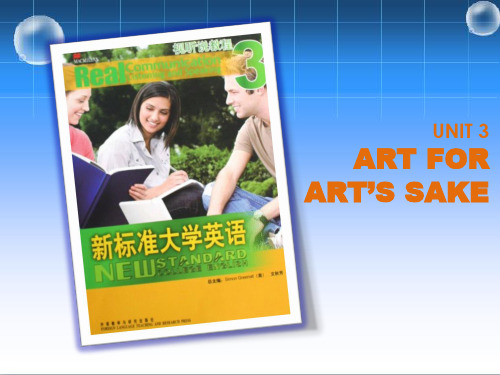
capacities. But, for the sake of analysis, the whole
listening process may become clearer if we break it
up into its component parts, so to speak. In a certain
Text
Did not Stravinsky himself proclaim that his music was an "object", a "thing", with a life of its own, and with no other meaning than its own purely musical existence? This intransigent attitude of Stravinsky's may be due to the fact that so many people have tried to read different meanings into so many pieces. Heaven knows it is difficult enough to say precisely what it is that a piece of music means, to say it definitely, to say it finally so that everyone is satisfied with your explanation. But that should not lead one to the other extreme of denying to music the right to be "expressive".
新进阶3综合的Unit3
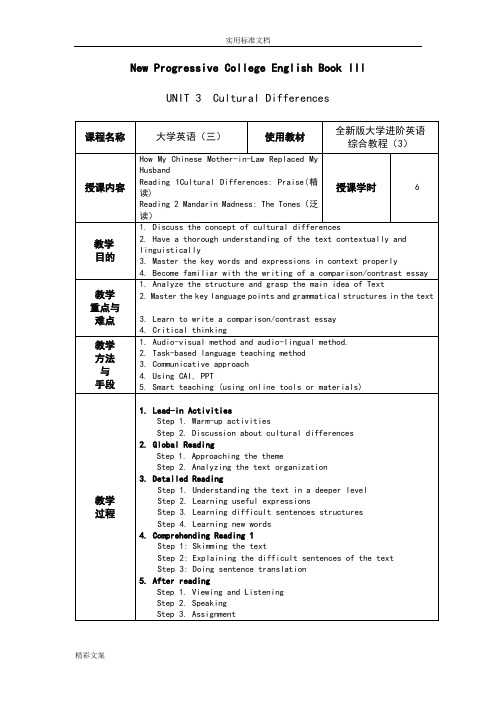
New Progressive College English Book III UNIT 3 Cultural DifferencesUnit 1 Cultural Differences1. Teaching Objectives:Students will be able toA. have a thorough understanding of the text contextually and linguisticallyB. illustrate the concept of cultural shock by giving examplesC. learn languages, e.g. words, phrases, difficult structureD. become familiar with the writing of a comparison/contrast essay2. Time Allotment:1st Period: Lead-in Activities (Warm-up activities; Discussion about cultural differences)2nd Period: Global-reading (Text: Approaching the theme; analyzing the text organization)3rd Period: Detailed reading (Understanding the Text A in a deeper level, analyzing difficult sentence structures)4th Period: Detailed reading Activities (Learning new words, summarizing good usage)5th Period: Comprehending Reading 1 (Skimming the text, explaining the difficult sentences of the Text, doing sentence translation))6th Period: After-reading Activities (Viewing and Listening; Speaking; Assignment)3. Teaching Procedures:3.1 Lead-in ActivitiesStep 1. Warm-up activitiesThe teacher introduces the topic to the class by asking if they can give any example of how Chinese and non-Chinese behave or think differently in life.Step 2: Discussion about cultural differencesThe teacher explains the pictures in Opener that illustrate the differences between the Westerner and Chinese in their perspectives on different issues. The teacher asks Ss to look at the pictures and discuss the differences in pairs with the aid of the questions that follow. The teacher has different pairs report to the class their discussion on the pictures, one pair for one picture.Method: Using task-based language teaching method, communicative approach.3.2 Global readingStep1. Approaching the themeThe teacher introduces the topic of the text by explaining the cultural shocks the author experienced after the birth of her daughter and her mother-in-law's fulltime presence in her family.Before moving on to the author's account, The teacher explains to Ss the text can roughly be divided into six parts.Method: PPT; communicative approach.Step2. Analyzing the text organizationThe teacher guides Ss to explore the text by asking them to work on the table in Text Organization and do the task in Digging into detail.Then students should sum up the differences of views between the author and her mother-in- law on matters described in the text.Method: skimming and scanning, communicative approach3.3 Detailed Reading3.3.1 Procedure1) Students are asked to read the passage carefully again and for each paragraph(sometimes two-three paragraphs), invite students to answer questions related difficult sentences and understanding of each paragraph.2) Help Ss find out the good usage in the text and underlined them.3) Learn new words in details.Purpose: Further understand the text and train scanning ability to learn difficult sentence structures as well as new words and expressions.Method: Reading the text together; Using task-based language teaching method, reading approach, communicative approach, grammar-translation approach.Step1. Understanding the text in a deeper levelParas.6Q. What made the author so mad about her husband that they began to fight over childcare duties?A: The fact that he wasn’t taking on half of the childcare duties, and he thought it was more important to spend time on his work than on his daughter, and his expectation that his mother would do all the housework he was supposed to do. Para.8Q: How did her mother-in-law explain her role in the family?A: Her mother-in-law explained that her role in the family was to lighten the burden of her son, allowing him to keep his former way of life, and to help her daughter-in-law out with parenting and household management.Para.9Q: What did the author think of her mother-in-law’s explanation?A: She thought it was absolutely unacceptable, because, in her view, her husband is one of two parents, and therefore their daughter should be half his responsibility; and she married her husband, not her mother-in-law.Para.13Q: How come her husband, unlike the author, failed to adopt daily habits around theschedule of her daughter?A: He obviously believed that mothers are the primary caregiver of children and this was the normal difference between mothers and fathers.Paras.16Q: How did the author react when she was told that, now that he mother-in-law helped her out by taking care of he daughter, it was her responsibility to take care of her mother-in-law when she was old?A: She totally rejected the idea, because she thought what her mother-in-law did was fulfilling the parenting responsibility of her husband, therefore it was her husband's responsibility to take care of his own mother when she was old.3.3.2 Language FocusStep2. Learning useful expressions3.3.2.1 Difficult words and phrases1) work out: find the solution to(a problem or question) 想出、得到(解决方法)e.g. It's important to work out a solution rather than engage in endless discussion.2) presence: n.存在;到场e.g. It's natural for a child to be chatting away in the presence of a loving parent.The tension of the protesters grew with the presence of police.3) extreme: a.(of views or actions)very different from what people accept as reasonable or normal 激的;过激的e.g. Extreme views sometimes can become very popular.Soldiers are trained to carry out orders even if they sound extreme.4) leave behind: depart and not take along 离开;地下e.g. The rough sea crossing served only to emphasize the peace we had left behind.The taxi driver always reminds his passengers not to leave behind their belongings.5) prominent: a. outstanding, important 笑出的;重要的e.g. I want our brand name to appear in the most prominent position of the stadium.We celebrate the Dragon Boat Festival in memory of a prominent ancient Chinese poet.6) primary: a. main 主要的e.g. The young man failed to see that the primary cause of his failure was his laziness and inaction.7) sacrifice: n.牺性;舍弃e.g. It is common for women to make lots of sacrifice for the family.The downside of a self-driving car is the sacrifice of the pleasure of driving.8) bonus: n.意外收获;红利;奖金e.g. I received a box of cookies as a bonus when I bought coffee at a cafe yesterday.Our salesperson's pay is made up of a base salary(about 60% of their total income)and a bonus(about 40% of their total income).9) occasional:a. occurring from time to time 偶尔的e.g. To the occasional swimmer, a season ticket is a waste of money.10) devotion: n.奉献,全身心投入e.g. The scientist who passed away last week was fondly remembered for his total devotion to science.11) household:n. the people of a house collectively 家庭e.g. She got up to prepare breakfast while the rest of the household was still asleep.12) look over one's shoulder: keep watch for danger or threats to oneself 不安;小心提防e.g. It was midnight when I left my office and on my way back home I kept looking over my shoulder to see if there was anyone tailing me.13) repay: vt. do sth. in return for a favor 报答:偿还e.g. There had never been any doubt in her mind that she would look after her parents in their oldage; they had given up a lot for her, she said, and that was how she would repay them. The company has to sell a building to repay its debt.14) kindness: n..仁慈;普行e.g. Very often it would be a kindness to tell a piece of bad news straight away.15) grateful: a. thankful 感激的e.g. The war refugees are very grateful to the local government for the timely help.16) phase: n..阶段;时期e.g. The minister claimed in his speech that the manufacturing industry wasentering a very different phase with the rapid growth of artificial intelligence.College marks a particular phase in a young person's life, the phase of newly gained independence.17) in one's eyes/in the eyes of: in the opinion of, from the perspective of 在.心日中e.g. The educator pointed out that a child could do no wrong in the eyes of some parents.18) fall short of: fail to satisfy 达不到,不符合e.g. I tried my best, yet my performance still fell short of my hopes.19) hono(u)r: vt. do what is required by a promise or a contract 信守;执行e.g. High school students in Shanghai must honour their community service commitments andcomplete at least 40 hours of volunteer work.The international company informed us that it will not be able to honour its contract with us.20) apparent: a. clear and obvious 明显的e.g. The professor said the young man had many good qualities despite his apparentassertiveness rudeness.21) wash up: wash dishes 饭后洗餐具e.g. Do Chinese husbands help to wash up after dinner?22) aspect: n..方面e.g. Dealing with people is a primary aspect of my work as a manager.23) burden: n.负担;重负e.g. I hate to be a burden on other people.She sat down on the floor and breathed heavily as though she had come up a hill with a burden beyond her strength.24) maintain:v. keep In a Certain state, position, or activity 维持;保持e.g. A police force is needed to maintain law and order.It is essential to build up and maintain a reasonable level of physical fitness.25) parenting: n.养育,抚养e.g. There are many programs aiming to teach new parents parenting skills.26) relieve...of: help(sb.)by taking (sth. heavy or difficult)from them 解除(某人)的(负担,困难等)e.g. Some people eat a lot to relieve themselves of anxieties.27) in one’s view: in one's personal opinion 在.看来;按.的看法e.g. In my view, the local government should do more for the elderly.28) responsibility:n. 责任;义务e.g. The mine owner denied all responsibility for the death of the trapped miners.A single parent has to struggle to balance work and family responsibilities.29) get...wrong: (informal) not understand correctly what(sb./sth.)means 误会e.g. Don’t get me wrong, please: I’m not quitting despite the setbacks.30) preference: n.喜好;偏好e.g. Customer preferences must be taken into consideration when designing a new product.Employers have a preference for college graduates who think critically and can communicate effectively.31) equivalent: a. equal as in value, force, or meaning 对等的e.g. His silence is equivalent to an admission of guilt.32) strike a balance: find a sensible middle point between two demands, extremes, etc.; compromise 调和;折衷e.g. The speaker set out his viewpoints on how to strike a balance between thefreedom of the press and the right to/of privacy.We have to strike a balance between offering people what they liked with the first movie and coming up with something new.33) put...in(to)perspective: judge(sth.)by considering it in relation to everything else 全面客观地看待(或判断)e.g. Before you begin to think that it might be safer to starve than to eat and run the risk of foodpoisoning, it's important to put the whole matter of food poisoning into perspective.34) barely:ad. .hardly 很少;几乎没有e.g. We had barely enough to eat, let alone to spare.It seemed that everyone was speaking and we could barely hear the speaker.35) in response to: in reaction to sth. that has happened or been said 对做出反应e.g. In response to traditional Chinese medication, the elderly gentleman quickly recovered.Step3. Learning difficult sentences structures3.3.2.2 Difficult sentences1) In my Western eyes, he was falling short of my expectations and wasn’t honoring his role as a father. (Para.6)As a Westerner, I found his conduct disappointing, and felt that he was failing to take on his responsibilities as a father.2) Our fights seemed to get us nowhere, however. (Para. 7)However, we failed to reach any agreement over the issue in spite of the arguments.3) I felt myself teetering backwards. (Para.9)I was totally shocked to hear what I was told, so much so that I felt as if I was thrown off balance.4) While the men were locked in their own conversation, I vented some of this conflict with the wife.(Para.14):While the men were engaged in talking among themselves, I voiced to the wife my complaints about the conflict.5) After getting away with not changing very many for his daughter, when the time comesTo change my mother-in-law’s diapers...(Para.16)Note that here “very many” refers to very many diapers. In speaking, “very many”in a negative context is common and acceptable.4. Comprehending Reading 1Teacher asks Ss to read aloud the new words and expressions in the margin, and guide them to sum up the different views regarding the value of praise between the author and her husband.Teacher has Ss complete Comprehension Check for Reading 1.Teacher clarifies some difficult points and do the task in Translation. 5. After Reading5.1 Viewing and ListeningTeacher introduces Viewing & Listening to the class: Cultural differences are the theme of this unit. Now we are going to hear an American teaching in China talk about the cultural differences he has observed between China and the West in general. Teacher plays the video clip once for general comprehension. Teacher plays it again for Ss to fill in the blanks. Time permitting; teacher has Ss work in pairs to discuss if they agree with the speaker’s views and why.5.2SpeakingTeacher explains the role play task by referring to the instructions. Teacher organizes a group discussion about the specific questions the TV presenter is going to ask. Ss may go over the Tips given in the box. Teacher lets Ss prepare the interview in groups of four, one playing the role of TV presenter, the others playing the roles of, respectively, Ember Swift, Yangxifu, and Sasha. The “TV presenter" makes a listof questions to be asked in the interview, and the Practicing “guests” note down the main idea of their answers to the presenter. Teacher invites at least one group to role-play it in class.5. 3 AssignmentTeacher asks Ss to skim the text and answer the questions in Comprehension Check for Reading 2.Teacher asks students to write an essay comparing and contrasting Chinese New Year celebrations with Christmas celebrations. Teacher encourages Ss to use words and expressions they’ve learnt from this unit and underline them in their essay. Teacher requires Ss to check it with the Evaluation criteria in Writing before turning in their homework.。
新标准大学英语综合教程3课文翻译和课后习题答案 Unit 3

Text
6 Listen, if you can, to the 48 fugue themes of Bach's Well-Tempered Clavichord. Listen to each theme, one after another. You will soon realize that each theme mirrors a different world of feeling. You will also soon realize that the more beautiful a theme seems to you the harder it is to find any word that will describe it to your complete satisfaction.
Text
8 The third plane on which music exists is the sheerly musical plane. Besides the pleasurable sound of music and the expressive feeling that it gives off, music does exist in terms of the notes themselves and of their manipulation. Most listeners are not sufficiently conscious of this third plane.
Text
Yes, you will certainly know whether it is a gay theme or a sad one. You will be able, in other words, in your own mind, to draw a frame of emotional feeling around your theme. Now study the sad one a little closer. Try to pin down the exact quality of its sadness. Is it pessimistically sad or resignedly sad; is it fatefully sad or smilingly sad?
新视界大学英语综合教程第三册Unit3Activereading课文及翻译
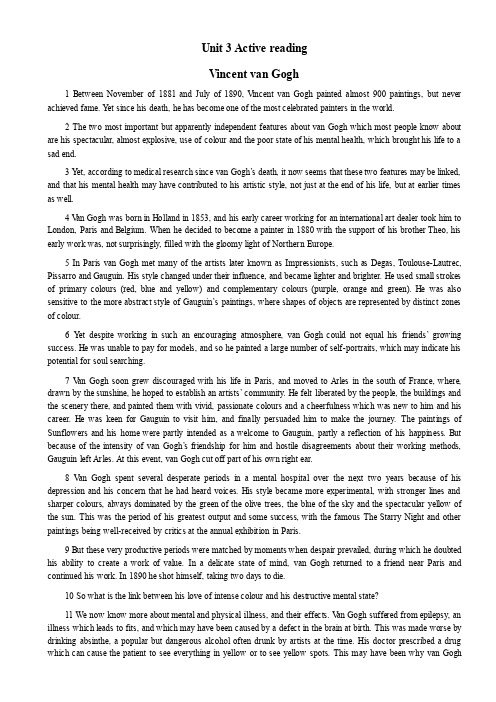
Unit 3 Active readingVincent van Gogh1 Between November of 1881 and July of 1890, V incent van Gogh painted almost 900 paintings, but never achieved fame. Y et since his death, he has become one of the most celebrated painters in the world.2 The two most important but apparently independent features about van Gogh which most people know about are his spectacular, almost explosive, use of colour and the poor state of his mental health, which brought his life to a sad end.3 Y et, according to medical resear ch since van Gogh’s death, it now seems that these two features may be linked, and that his mental health may have contributed to his artistic style, not just at the end of his life, but at earlier times as well.4 V an Gogh was born in Holland in 1853, and his early career working for an international art dealer took him to London, Paris and Belgium. When he decided to become a painter in 1880 with the support of his brother Theo, his early work was, not surprisingly, filled with the gloomy light of Northern Europe.5 In Paris van Gogh met many of the artists later known as Impressionists, such as Degas, Toulouse-Lautrec, Pissarro and Gauguin. His style changed under their influence, and became lighter and brighter. He used small strokes of primary colours (red, blue and yellow) and complementary colours (purple, orange and green). He was also sensitive to the more abstract style of Gauguin’s paintings, where shapes of objects are represented by distinct zones of colour.6 Y et despite working in such an enco uraging atmosphere, van Gogh could not equal his friends’ growing success. He was unable to pay for models, and so he painted a large number of self-portraits, which may indicate his potential for soul searching.7 V an Gogh soon grew discouraged with his life in Paris, and moved to Arles in the south of France, where, drawn by the sunshine, he hoped to establish an artists’ community. He felt liberated by the people, the buildings and the scenery there, and painted them with vivid, passionate colours and a cheerfulness which was new to him and his career. He was keen for Gauguin to visit him, and finally persuaded him to make the journey. The paintings of Sunflowers and his home were partly intended as a welcome to Gauguin, partly a reflection of his happiness. But because of the intensity of van Gogh’s friendship for him and hostile disagreements about their working methods, Gauguin left Arles. At this event, van Gogh cut off part of his own right ear.8 V an Gogh spent several desperate periods in a mental hospital over the next two years because of his depression and his concern that he had heard voices. His style became more experimental, with stronger lines and sharper colours, always dominated by the green of the olive trees, the blue of the sky and the spectacular yellow of the sun. This was the period of his greatest output and some success, with the famous The Starry Night and other paintings being well-received by critics at the annual exhibition in Paris.9 But these very productive periods were matched by moments when despair prevailed, during which he doubted his ability to create a work of value. In a delicate state of mind, van Gogh returned to a friend near Paris and continued his work. In 1890 he shot himself, taking two days to die.10 So what is the link between his love of intense colour and his destructive mental state?11 We now know more about mental and physical illness, and their effects. V an Gogh suffered from epilepsy, an illness which leads to fits, and which may have been caused by a defect in the brain at birth. This was made worse by drinking absinthe, a popular but dangerous alcohol often drunk by artists at the time. His doctor prescribed a drug which can cause the patient to see everything in yellow or to see yellow spots. This may have been why van Goghloved the colour.12 V an Gogh experienced a surge of activity, after which he became tired and depressed. We now recognize these to be symptoms of bipolar disorder. He also used lead-based paints, exposure to which can lead to lead poisoning. One of the symptoms of lead poisoning is a swelling of the retinas in the eyes, which can cause one to see light in circles around objects. We can see this effect in paintings such as The Starry Night.13 Another condition linked to epilepsy and manic behaviour is the spontaneous need to write continuously. V an Gogh wrote over 800 letters to his brother, Theo, which might be the result of this condition.14 V an Gogh wanted his paintings to be realistic, so he worked outdoors. Some of the episodes of aggressiveness and feeling sick may be the effects of sunstroke.15 Finally, hearing voices is a well-established symptom of schizophrenia, a serious mental illness which changes the relationship between what you think and reality.16 We talk about the genius necessary to produce great works of art. In van Gogh’s case, his genius, especially in his use of colour, may be due to his mental health. As art lovers, we acknowledge that van Gogh produced some of the greatest paintings the world has ever known, and gave inspiration to so many later artists. But we should not overlook the mental torture he suffered for his art.文森特·凡·高1 在1881年11月至1890年7月之间,文森特·凡·高大约画了900幅画,却没有成名。
大学英语三(综合教程)第三单元
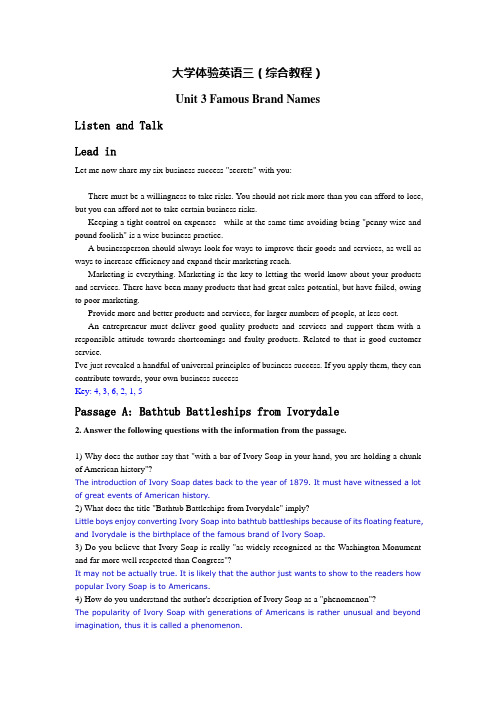
大学体验英语三(综合教程)Unit 3 Famous Brand NamesListen and TalkLead inLet me now share my six business success "secrets" with you:___There must be a willingness to take risks. Y ou should not risk more than you can afford to lose, but you can afford not to take certain business risks.___Keeping a tight control on expenses - while at the same time avoiding being "penny wise and pound foolish" is a wise business practice.___A businessperson should always look for ways to improve their goods and services, as well as ways to increase efficiency and expand their marketing reach.___Marketing is everything. Marketing is the key to letting the world know about your products and services. There have been many products that had great sales potential, but have failed, owing to poor marketing.___Provide more and better products and services, for larger numbers of people, at less cost.___An entrepreneur must deliver good quality products and services and support them with a responsible attitude towards shortcomings and faulty products. Related to that is good customer service.I've just revealed a handful of universal principles of business success. If you apply them, they can contribute towards, your own business successKey: 4, 3, 6, 2, 1, 5Passage A: Bathtub Battleships from Ivorydale2. Answer the following questions with the information from the passage.1) Why does the author say that "with a bar of Ivory Soap in your hand, you are holding a chunk of American history"?The introduction of Ivory Soap dates back to the year of 1879. It must have witnessed a lot of great events of American history.2) What does the title "Bathtub Battleships from Ivorydale" imply?Little boys enjoy converting Ivory Soap into bathtub battleships because of its floating feature, and Ivorydale is the birthplace of the famous brand of Ivory Soap.3) Do you believe that Ivory Soap is really "as widely recognized as the Washington Monument and far more well respected than Congress"?It may not be actually true. It is likely that the author just wants to show to the readers how popular Ivory Soap is to Americans.4) How do you understand the author's description of Ivory Soap as a "phenomenon"?The popularity of Ivory Soap with generations of Americans is rather unusual and beyond imagination, thus it is called a phenomenon.5) Can you name some of the important factors necessary for a successful business?Open3. Choose the best answer to each question with the information from the passage.1. We may infer from the passage that ______.A) Proctor & Gamble was not impressively successful in its first 20 years.B) the sales of Ivory Soap reach as high as more than thirty billion dollars per yearC) the factory of Proctor & Gamble is located in Ivorydale, hence the name of the soapD) Proctor & Gamble was founded by two immigrants shortly before the Civil War2. The most important reason for the great success of Ivory Soap lies in ______.A) its brand name which was lifted from the BibleB) its successful nationwide advertising campaignC) its feature of being 99.44/100 percent pureD) its mass production and low cost3. By saying that "Ivory Soap is an American Institution", the author indicates that ______.A) Ivory Soap is a brand name of Proctor & Gamble's products in AmericaB) Ivory Soap is an organization for providing washing powderC) Ivory Soap is well-known to AmericansD) Ivory Soap is a landmark building in America4. Proctor & Gamble introduced Ivory Soap in order to ______.A) compete with high-quality soaps coming from foreign countriesB) arouse children's interest so that they would become loyal consumersC) satisfy American mothers' need of washing out the mouths of their childrenD) bring a big break to the company and reach one million dollars in sales5. According to the passage, which of the following statements is true?A) Ivory Soap is as solid and spotless as the marble of the Lincoln Memorial.B) Soap operas became known as a result of a P&G sponsored radio serial.C) Ivory Soap is eatable and doesn't even taste all that bad.D) Proctor & Gamble keeps a precise count of the bars of Ivory Soap having been sold.Anwser: 1.A, 2.B, 3.C, 4.A, 5.B4.Fill in each of the blanks with an appropriate word.The example of Proctor and Gamble’s famous Ivory Soap shows the potential that lies in mass marketing and planned a___and the importance of recognizable b___names. Ivory Soap, first produced in 1879, was well p___with clever slogans. These slogans, particularly the idea that the soap is so pure that it floats, p___so successful that they are still p___today. At the same time, the use of the radio serial for Ivory promotion gave rise to the e___"soap opera", which has become a modern g___ phenomenon. The development of Proctor and Gamble itself, from a small-scale operation founded by two i___to a multinational empire of today serves as a good example to build brand names.Anwser: 1.advertising 2.brand 3.promoted 4.proved5.popular6.expression7.global8.immigrants5. Underline the words in the following sentences which can be translated into “保证”, and then translate the sentences into Chinese.1. France has already pledged billions of dollars in aid next year.France has already pledged billions of dollars in aid next year.法国已经保证明年提供数十亿美元的援助。
全新版大学英语综合教程第三册 Unit 3PPT课件
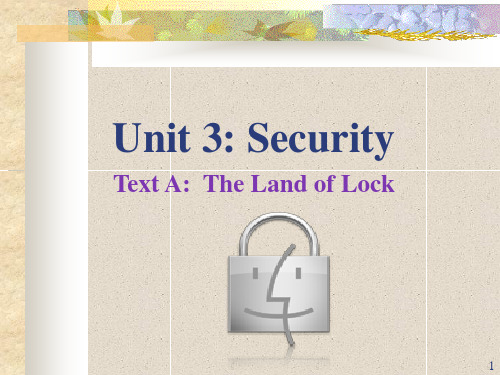
6
II. Various kinds of security devices: 1) Dead-bolt locks, security chains, electro-nic
2
Greene's frequent ink-stained trips to the past tell us that though we've gained much as time has marched forward, we have lost much as well. We have lost, as Greene emphasizes, our inability to escape the technology that aids us. This test “The Land of The Lock” is just a good example of his works.
5
I. Text Organization Part 1: Paras. 1-3:
In America the era of leaving the front door on the latch at night is over. Part 2: Paras. 4-15:
A new atmosphere of fear and distrust creeps into every aspect of daily life. As a result, security devices, in varied forms, are put to use. Part 3: Paras. 16-end:
新标准大学英语综合教程3unit3

2) suggesting physical pleasure 肉体享受的;性感的 e.g. She was attracted by that actor’s sensuous lips.
她被那个演员性感的嘴唇所吸引。
Words & Phrases
expressive
a.
1) clearly showing what your thoughts or feelings are, especially by your behavior (尤指行为)富于表现力的,
qualified
a. able to do sth., because you have the knowledge, skill, or experience that is needed 有资格的;有能力的 e.g. 1. She is well qualified to give an opinion.
qualify
v. 1) (~ as / for) have the right qualities or be in the right situation to be considered as sth. or to receive or do sth. 有资格 e.g. Our team has qualified for the semi-final.
我不想谈论假设的情况。
2. Uniform motion is only hypothetical.
匀速运动只是一种假设性的运动。
Word family: hypothetically ad.
hypothesis n.
Words & Phrases
absent-mindedly
新标准大学英语综合教程3 unit3 课文翻译
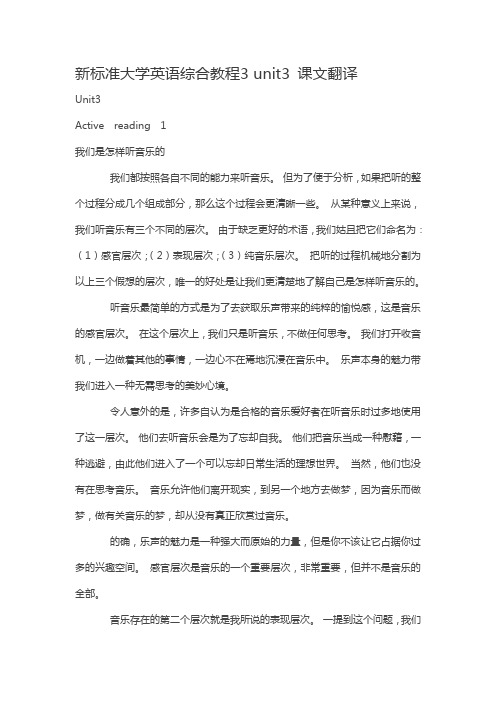
新标准大学英语综合教程3 unit3 课文翻译Unit3Active reading 1我们是怎样听音乐的我们都按照各自不同的能力来听音乐。
但为了便于分析,如果把听的整个过程分成几个组成部分,那么这个过程会更清晰一些。
从某种意义上来说,我们听音乐有三个不同的层次。
由于缺乏更好的术语,我们姑且把它们命名为:(1)感官层次;(2)表现层次;(3)纯音乐层次。
把听的过程机械地分割为以上三个假想的层次,唯一的好处是让我们更清楚地了解自己是怎样听音乐的。
听音乐最简单的方式是为了去获取乐声带来的纯粹的愉悦感,这是音乐的感官层次。
在这个层次上,我们只是听音乐,不做任何思考。
我们打开收音机,一边做着其他的事情,一边心不在焉地沉浸在音乐中。
乐声本身的魅力带我们进入一种无需思考的美妙心境。
令人意外的是,许多自认为是合格的音乐爱好者在听音乐时过多地使用了这一层次。
他们去听音乐会是为了忘却自我。
他们把音乐当成一种慰藉,一种逃避,由此他们进入了一个可以忘却日常生活的理想世界。
当然,他们也没有在思考音乐。
音乐允许他们离开现实,到另一个地方去做梦,因为音乐而做梦,做有关音乐的梦,却从没有真正欣赏过音乐。
的确,乐声的魅力是一种强大而原始的力量,但是你不该让它占据你过多的兴趣空间。
感官层次是音乐的一个重要层次,非常重要,但并不是音乐的全部。
音乐存在的第二个层次就是我所说的表现层次。
一提到这个问题,我们马上就进入到一个颇具争议的领域。
作曲家总是设法避开有关音乐表现方面的讨论。
斯特拉温斯基不是曾经声称他的音乐是一个“物体”,是一件有自我生命的“东西”,除了纯音乐性的存在之外没有任何别的含意吗?斯特拉温斯基这种不妥协的态度可能源于这样的一个事实:有那么多的人尝试着从众多的音乐作品中读出完全不同的含意。
确实,要准确地说出一部音乐作品的含意已经很难了,要肯定并确定地说出来,还要使每个人对你的解释都感到满意,是难上加难。
但我们不该因此走到另一个极端,不能去剥夺音乐“表现”的权利。
新世纪大学英语 (第二版) 综合教程3 电子教案 BOOK3 UNIT3

7
新世纪大学英语系列教材(第二版)综合教程3
Gotes Watching and Discussion
Unit 3
True friendship is like sound health; the value of it is seldom known until it is lost. —Charles Caleb Colton Interpretation: Friendship is compared to health. One often fails to see the value of health until it is lost. The same is true of friendships.
wrongdoing n.
bad, evil, or illegal behaviour 坏事;不道德或不法的行为
12
新世纪大学英语系列教材(第二版)综合教程3
Listen and Respond
Word Bank Task One Task Two
Unit 3
bring…to an end
cause sth. to finish, usu. after lasting some time 使某物结束, 终止
15
新世纪大学英语系列教材(第二版)综合教程3
Listen and Respond
Word Bank Task One Task Two
Unit 3
2. Who will end the friendship with the person that is in your life for a reason? A) The person himself. B) You. C) Neither you nor the person. D) Both you and the person.
全新版大学英语综合教程3课后习题翻译题目及答案
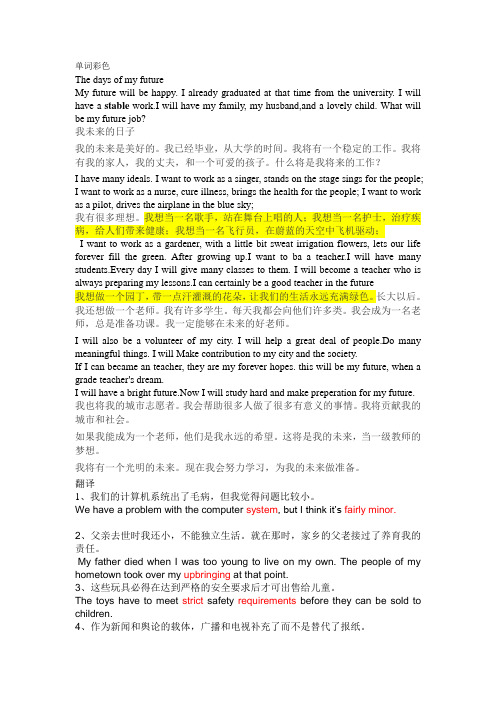
单词彩色The days of my futureMy future will be happy. I already graduated at that time from the university. I will have a stable work.I will have my family, my husband,and a lovely child. What will be my future job?我未来的日子我的未来是美好的。
我已经毕业,从大学的时间。
我将有一个稳定的工作。
我将有我的家人,我的丈夫,和一个可爱的孩子。
什么将是我将来的工作?I have many ideals. I want to work as a singer, stands on the stage sings for the people;I want to work as a nurse, cure illness, brings the health for the people; I want to work as a pilot, drives the airplane in the blue sky;我有很多理想。
我想当一名歌手,站在舞台上唱的人;我想当一名护士,治疗疾病,给人们带来健康;我想当一名飞行员,在蔚蓝的天空中飞机驱动;I want to work as a gardener, with a little bit sweat irrigation flowers, lets our life forever fill the green. After growing up.I want to ba a teacher.I will have many students.Every day I will give many classes to them. I will become a teacher who is always preparing my lessons.I can certainly be a good teacher in the future我想做一个园丁,带一点汗灌溉的花朵,让我们的生活永远充满绿色。
大学英语综合教程unit3参考答案
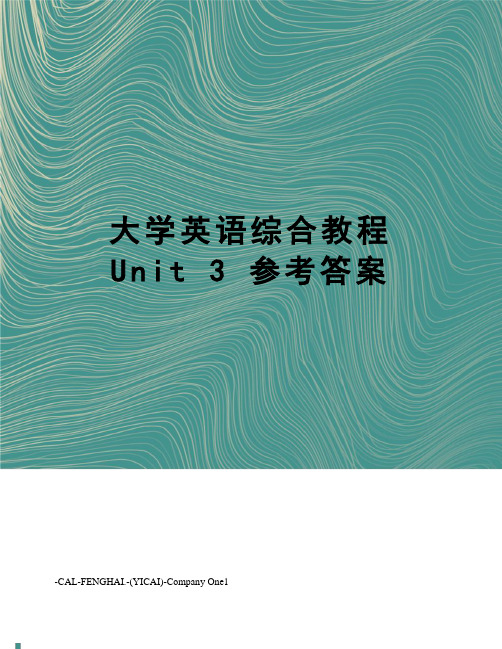
大学英语综合教程U n i t3参考答案-CAL-FENGHAI.-(YICAI)-Company One1Key to Unit 3Text A Public Attitudes Toward Science课前预习Directions: Read the text and find out the English versions for the following expressions.1.享有特权的少数人 a privileged minority (Para.1, L.6)2.大多数民众the vast minority of population (Para.1,L.8)3.将时钟拨回到从前put the clock back to an earlier age (Para.2, L.1)4.阻止未来的进一步发展 prevent further advances in the future (Para.2, L.3)5.带来技术的发展bring about advances in technology (Para.2, L.6)6.压制新生事物suppress anything new (Para.2, L.10)7.人的积极极性和创造力 human initiative and inventiveness (Para.2, L.10)8.延缓变化的速度slow down the rate of change (Para.2, L.12)9.确保方向正确的变化ensure the changes in the right direction (Para.3,L.2)10.在一个民主社会in a democratic society (Para.3, L.3)11.做出明智的决定make informed decisions (Para.3, L.5)12.对科学抱着矛盾的态度 be in two minds about science (Para.3, L.7)13.生活水平的稳步提高the steady increase in the standard of living (Para.3, L.8)14.科幻小说science fiction (Para.3, L.17)15.利用这种兴趣harness this interest (Para.4, L.1)16.以一种枯燥乏味的方式 in a dry and uninteresting manner (Para.4, L.6)17.认识其与世界的联系see its relevance to the world (Para.4, L.7)18.通俗读物popular books (Para.4, L.11)19.倾向于做某事tend to do sth. (Para.5, L.1)20.科学概念scientific concepts (Para.5, L.4)21.用文字和图表表述convey sth. by words and diagrams (Para.5, L.4)22.提供基本框架provide the basic framework (Para.6, L.1)23.阐明新的发展put across new developments (Para.6, L.8)24.小部分人 a small proportion of the population (Para.6, L.10)25.科学奇迹scientific wonders (Para.6, L.12)26.负有教育民众的重任have a responsibility to educate the public (Para.6, L.16)27.娱乐民众entertain the public (Para.6, L.16)28.危机四伏be filled with dangers (Para.7, L.1)29.接触外星文明contact an alien civilization (Para.7, L.2)30.充分相信have sufficient faith in sth. (Para.7, L.4)巩固应用I. Directions: Now you’ve learned Text A in detail. Let’s check how much you’ve learned from it! Please translate the Chinese expressions in the following sentences into English. Be sure you use expressions from the text.1.Whether you believe it or not (信不信由你),we were left waiting in the rainfor two hours.(Para.1, L.1)2.We saw /viewed this event as a turning point (把这件事看作是一个转折点).(Para.1, L.4)3.I can’t afford a car, so I guess I will have to do without (就只好不用了) . (Para.1,L.7)4.Forget all about it and look to the future; you can’t put the clock back (让时光倒流). (Para.2, L.1)5.He can’t see, nor could he hear (他还听不见) until a month ago. (Para.2, L.3)6.I have come to realize (逐渐意识到) that what I have done is misguided.(Para.3,L.7)7.As was mentioned in my last letter (正如上封信中所提到的),I’ll be back inOhio in June. (Para.3, L.15)8.I am wearing twice as much as I usually do (是平时穿的两倍) because of thecold weather. (Para.4, L.14)ter, I’ll prove what you say wrong (证明你所说的是错的). (Para.7, L.5)II. Language FocusEx. I. Translate the following English expressions into Chinese and Chinese into English.1.The line of products will be highly profitable.这个行业的产品将十分有利可图(P.67-I-3-3)2.regain health 恢复健康 (P.68-II-1)3.the right attitude towards science 对科学的正确态度 (P69-Cloze 1- L.1)4.the proportion of the population that………人口的比例 (P.69-Cloze 1-L.9)5.make discoveries that have practical value 做出具有实际应用价值的发现(P.69-Cloze 2- L.5)6. a glass wire 光纤 (P.70-Cloze2-L.7)7.endless number of new discoveries 无穷无尽的新发现(P.70-Cloze 2- L.10)8.in a space station in orbit around the earth 在一个围绕地球轨道运行的空间站(P.70-Cloze 2- L.17)9.扔掉这些旧椅子get rid of these old chairs(P.66-I-1-5)10.及时的帮助timely help (P.66-I-1-9)11.做出精确的预言make accuratepredictions (P.67- I-3-3)12.对……迟疑不决be undecided about(P.68- II-2)13.山区the mountainousregion (P.68-II-3)14.缺少,不足be undersuppliedwith (P.68- II-3)15.提出……的要求作为demand... as… (P.68-II-5)16.在做某事上有困难have difficulty (in) doingsth. (P.68-II-7)17.总的来说on balance (P.69-III-2-4)18.优点多于缺点Strengths outweighweaknesses. (P.69-III-2-4)19.对……怀疑be distrustful ofsth. (P.69-Cloze 1-L.2)Ex. II. Please translate the Chinese expressions in the following sentences into English. Be sure to use expressions from the exercises.1.As pace of life quickens (随着生活的节奏加快), things tend to change fast in thecity. (P.66-I-1-4)2.The decision on the new project is made on the basis of scientific study (在科学研究的基础之上). (P.67-I-3-2)3.We have succeeded because we had the foresight to invest in new technology(投资于新技术的先见之明). (P.68-II-6)4.Only a minority of people support military action. The majority are for a peacefulsolution (赞成和平解决). (P.69-III-2-1)5.Applicants who meet our job requirements (符合我们的工作要求) are accepted,those who fall short (不符合条件的) are rejected. (P.69-III-2-2)6.As is shown by history (正如历史所表明的), local clashes may lead to a globalwar. (P.69-III-2-5)III. Language EnhancementEx. I. Translate the following Chinese sentences into English.1. 无论你是否相信,我们的家乡在过去的十年间发生了许多变化,而且在未来的十年里变化会更多。
- 1、下载文档前请自行甄别文档内容的完整性,平台不提供额外的编辑、内容补充、找答案等附加服务。
- 2、"仅部分预览"的文档,不可在线预览部分如存在完整性等问题,可反馈申请退款(可完整预览的文档不适用该条件!)。
- 3、如文档侵犯您的权益,请联系客服反馈,我们会尽快为您处理(人工客服工作时间:9:00-18:30)。
大学体验英语三(综合教程)Unit 3 Famous Brand NamesListen and TalkLead inLet me now share my six business success "secrets" with you:___There must be a willingness to take risks. You should not risk more than you can afford to lose, but you can afford not to take certain business risks.___Keeping a tight control on expenses - while at the same time avoiding being "penny wise and pound foolish" is a wise business practice.___A businessperson should always look for ways to improve their goods and services, as well as ways to increase efficiency and expand their marketing reach.___Marketing is everything. Marketing is the key to letting the world know about your products and services. There have been many products that had great sales potential, but have failed, owing to poor marketing.___Provide more and better products and services, for larger numbers of people, at less cost.___An entrepreneur must deliver good quality products and services and support them with a responsible attitude towards shortcomings and faulty products. Related to that is good customer service.I've just revealed a handful of universal principles of business success. If you apply them, they can contribute towards, your own business successKey: 4, 3, 6, 2, 1, 5Passage A: Bathtub Battleships from Ivorydale2. Answer the following questions with the information from the passage.1) Why does the author say that "with a bar of Ivory Soap in your hand, you are holding a chunk of American history"?The introduction of Ivory Soap dates back to the year of 1879. It must have witnessed a lot of great events of American history.2) What does the title "Bathtub Battleships from Ivorydale" imply?Little boys enjoy converting Ivory Soap into bathtub battleships because of its floating feature, and Ivorydale is the birthplace of the famous brand of Ivory Soap.3) Do you believe that Ivory Soap is really "as widely recognized as the Washington Monument and far more well respected than Congress"?It may not be actually true. It is likely that the author just wants to show to the readers how popular Ivory Soap is to Americans.4) How do you understand the author's description of Ivory Soap as a "phenomenon"?The popularity of Ivory Soap with generations of Americans is rather unusual and beyond imagination, thus it is called a phenomenon.5) Can you name some of the important factors necessary for a successful business?Open3. Choose the best answer to each question with the information from the passage.1. We may infer from the passage that ______.A) Proctor & Gamble was not impressively successful in its first 20 years.B) the sales of Ivory Soap reach as high as more than thirty billion dollars per yearC) the factory of Proctor & Gamble is located in Ivorydale, hence the name of the soapD) Proctor & Gamble was founded by two immigrants shortly before the Civil War2. The most important reason for the great success of Ivory Soap lies in ______.A) its brand name which was lifted from the BibleB) its successful nationwide advertising campaignC) its feature of being 99.44/100 percent pureD) its mass production and low cost3. By saying that "Ivory Soap is an American Institution", the author indicates that ______.A) Ivory Soap is a brand name of Proctor & Gamble's products in AmericaB) Ivory Soap is an organization for providing washing powderC) Ivory Soap is well-known to AmericansD) Ivory Soap is a landmark building in America4. Proctor & Gamble introduced Ivory Soap in order to ______.A) compete with high-quality soaps coming from foreign countriesB) arouse children's interest so that they would become loyal consumersC) satisfy American mothers' need of washing out the mouths of their childrenD) bring a big break to the company and reach one million dollars in sales5. According to the passage, which of the following statements is true?A) Ivory Soap is as solid and spotless as the marble of the Lincoln Memorial.B) Soap operas became known as a result of a P&G sponsored radio serial.C) Ivory Soap is eatable and doesn't even taste all that bad.D) Proctor & Gamble keeps a precise count of the bars of Ivory Soap having been sold.Anwser: 1.A, 2.B, 3.C, 4.A, 5.B4.Fill in each of the blanks with an appropriate word.The example of Proctor and Gamble’s famous Ivory Soap shows the potential that lies in mass marketing and planned a___and the importance of recognizable b___names. Ivory Soap, first produced in 1879, was well p___with clever slogans. These slogans, particularly the idea that the soap is so pure that it floats, p___so successful that they are still p___today. At the same time, the use of the radio serial for Ivory promotion gave rise to the e___"soap opera", which has become a modern g___ phenomenon. The development of Proctor and Gamble itself, from a small-scale operation founded by two i___to a multinational empire of today serves as a good example to build brand names.Anwser: 1.advertising 2.brand 3.promoted 4.proved5.popular6.expression7.global8.immigrants5. Underline the words in the following sentences which can be translated into “保证”, and then translate the sentences into Chinese.1. France has already pledged billions of dollars in aid next year.France has already pledged billions of dollars in aid next year.法国已经保证明年提供数十亿美元的援助。
